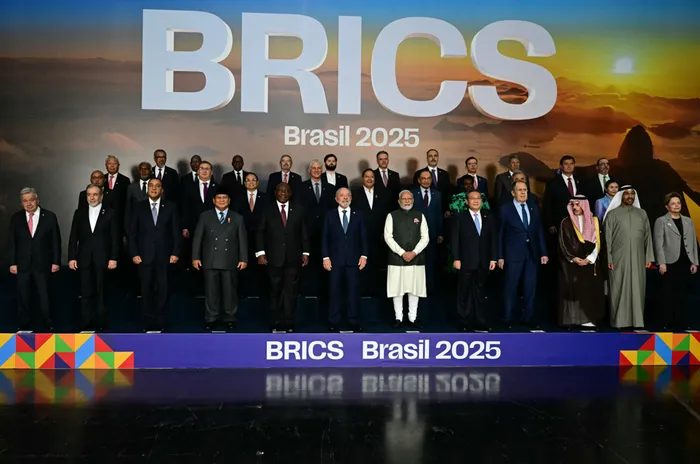
Heads of state and government of member, partner, and external engagement countries pose for a family photo during the BRICS summit in Rio de Janeiro, Brazil, on July 7, 2025.
Image: AFP
The 2025 BRICS Summit in Rio De Janeiro, Brazil, took place amidst a myriad of geopolitical conflicts. As it stands: the Russia-Ukraine conflict has received renewed momentum; the crisis in the Middle East has been exacerbated involving both Iran and the US–culminating in the US striking Iran; the conflict between India and Pakistan remain tense; multiple African conflicts in the Democratic Republic of Congo (DRC), Sudan, and Sahel.
The BRICS 2025 summit features a broad and ambitious agenda, addressing several urgent global priorities. Discussions are set to cover public health cooperation, economic and financial integration, climate policy, artificial intelligence governance, multilateral security reforms, and institutional strengthening.
On the issue of global health, leaders aim to promote fair and universal access to essential medicines and vaccines. Trade, investment, and financial cooperation will be a major focus, with renewed dialogue on advancing a shared BRICS currency and reducing dependency on the US dollar in cross-border transactions.
Climate change remains high on the agenda, with member states expected to launch a joint "BRICS Climate Leadership Strategy" to drive coordinated environmental action. Efforts to establish inclusive global frameworks for governing artificial intelligence will also take centre stage, as the bloc pushes for ethical and balanced oversight in emerging technologies.
The summit will explore ways to reform the international peace and security system, advocating for more equitable global governance structures. Finally, institutional development will focus on enhancing internal coordination mechanisms within the newly expanded BRICS grouping.
In the lead-up to the 17th BRICS Summit, Colombia and Uzbekistan have formally become members of the New Development Bank (NDB), bringing the total number of participating countries to eleven. Established in 2015 by the founding BRICS nations, the NDB was created to finance infrastructure and sustainable development initiatives across emerging markets.
Speaking at a press conference after the bank’s 10th Board of Directors meeting, NDB President Dilma Rousseff reiterated the institution’s commitment to supporting the Global South. She highlighted the importance of investment in innovation, science, and technology to help member states transition effectively into the Fourth Industrial Revolution.
Current members of the NDB include India, Brazil, Russia, China, South Africa, Bangladesh, the United Arab Emirates, Egypt, and Algeria. With its headquarters in Shanghai, the bank has so far approved over 120 projects spanning key sectors such as renewable energy, transportation, environmental conservation, water and sanitation, and digital infrastructure.
The 2025 BRICS summit marks a significant milestone for the coalition, underscoring the impact of its growing membership and increasing influence in world affairs. Under Brazil’s presidency, the summit will reaffirm the bloc’s commitment to deeper South-South cooperation and structural reforms in global governance institutions. Its wide-ranging agenda illustrates the diverse priorities and shared challenges confronting the Global South.
Among the standout developments at the Rio summit were unified concerns over rising global tariffs, viewed as threats to fair trade—implicitly referencing recent US policies. BRICS leaders also condemned the targeting of Iranian infrastructure, reflecting shared unease over escalating regional tensions.
The summit’s focus areas—ranging from public health and financial sovereignty to climate action and AI regulation—highlight the bloc’s broader ambition to shape international discourse. Beyond formal sessions, the event also served as an umbrella for cultural and economic engagements, such as the BRICS Games in Brazil and youth entrepreneurship forums in India, strengthening collaboration across various sectors.
*Dr Iqbal Survé
Past chairman of the BRICS Business Council and co-chairman of the BRICS Media Forum and the BRNN
*Cole Jackson
Lead Associate at BRICS+ Consulting Group
Chinese & South American Specialist
** MORE ARTICLES ON OUR WEBSITE https://bricscg.com/
** Follow @brics_daily on X/Twitter & @brics_daily on Instagram for daily BRICS+ updates
Related Topics:
